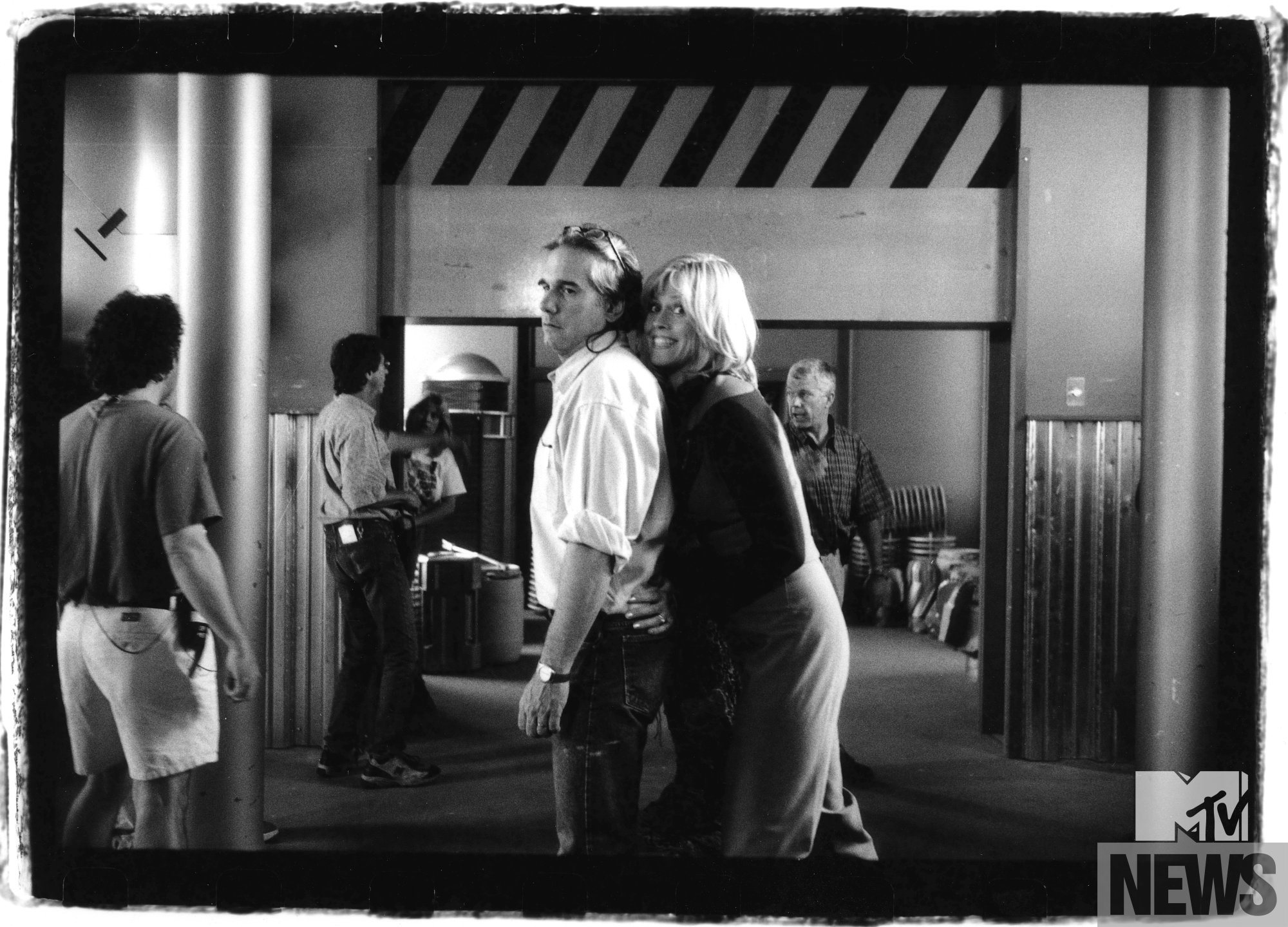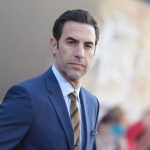‘Galaxy Quest’: The Oral History
[The original is no longer on the MTV website, at least the old link doesn’t work. We found a copy of the article on the forum, so we’re providing the link.]
By Grabthar’s Hammer, the sci-fi comedy classic is turning 15. Here’s the untold story of how it got made.
by MTV
By Jordan Hoffman
“Never give up, never surrender!”
That’s the hokey battle cry spoken by fictional Commander Peter Taggart, but it also easily applies to the long journey to get the beloved cult film “Galaxy Quest” to the screen.
In 1999 Mark Johnson, already an Oscar winner for “Rain Man,” was an independent producer with a deal at DreamWorks Studios. Johnson’s scouts had come across a screenplay called “Captain Starshine” that, by all accounts, wasn’t particularly good, but which had that killer “what if” hook.
Basically: what if the Thermians – a group of goofy space aliens – misconstrued old episodes of a “Star Trek”-esque show called “Galaxy Quest” as “historical documents” about brave interstellar warriors? And based their entire society and all of their technology on it? And when their planet was threatened, went to the crew for help, only to discover (eventually) they were out of work actors?
“Galaxy Quest” was only a modest success in theaters (pulling in $71 million at the domestic box office). Over time, however, it has become a cult favorite – a film virtually everyone loves, one of those flicks you see when flipping channels and immediately get caught in its tractor beam. (Not that the movie has tractor beams – that would be too close to “Star Trek.”)
In honor of the almost 15th anniversary of the movie (it was released in December, 1999), MTV News checked back in with the entire cast and creators of “Galaxy Quest”: Tim Allen as the obnoxious Captain; Alan Rickman as the humiliated thespian relegated to rubber makeup; Sigourney Weaver, an actress given nothing to do but show her cleavage; Daryl “Chill” Mitchell, the former child star. Tony Shalhoub, playing a stoner who is supposed to be the sharp chief engineer; Sam Rockwell as some guy named Guy; and many, many more. What we came away with is, in the cast and crew’s own words, the story of how the crew of the Protector came together – and how things changed as the movie grew to be the phenomenon it is today.
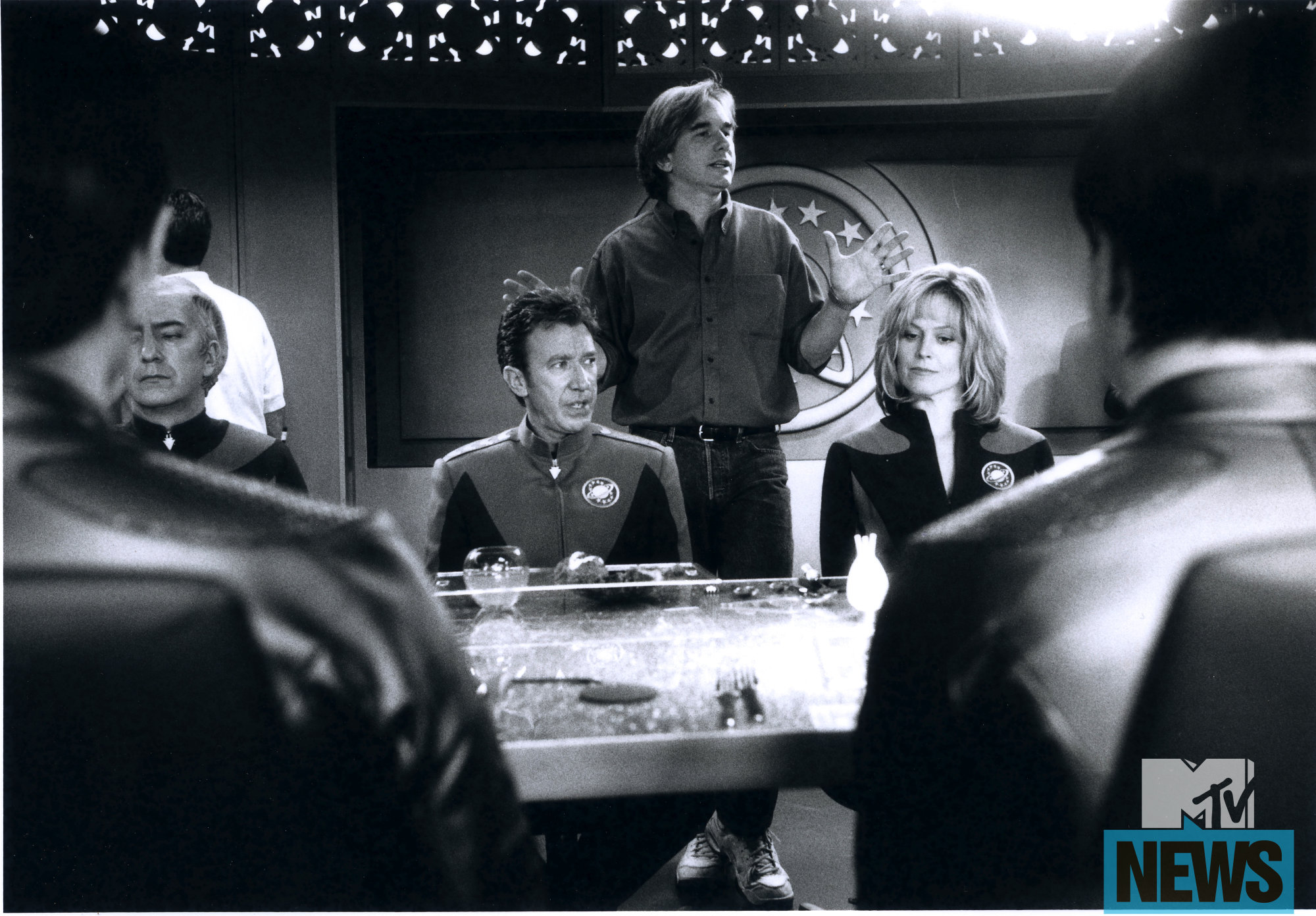
Mark Johnson (producer): The original David Howard draft of “Captain Starshine” – very few people have ever read that. The original concept was brilliant, but we needed someone like a Bob Gordon to take it from there.
Robert Gordon (screenwriter): I didn’t read [“Captain Starshine”] until after the film was made. I heard the logline from my agent. I thought that it could be a great idea or it could be a terrible idea. I didn’t take the job at first because I thought it was too hard, but I would go in with a scene like, “Tommy takes the ship out of the dock and scratches it on the side.” They would say, “That’s great, you should write it,” and I’d say, “Uh, I don’t have it yet.” Only when I nailed the scene where the Captain has to admit he’s a fraud, then I said “I’ve got it.”
Dean Parisot (director): At the risk of sounding pretentious, there are a whole lot of themes playing in there. The movie needed to begin as a mockery and end as a celebration. That’s a hard thing to do. Part of the mission for me was to make a great “Star Trek” episode.
George Takei (as quoted on SciFi.com in 1999): [“Galaxy Quest” is] a chillingly realistic documentary.
Parisot: I was a huge “Star Trek” fan. My brother took my mother’s gray station wagon and wrote NCC-1701 on the door. We put two tubes on the roof rack that shot rockets off the top.
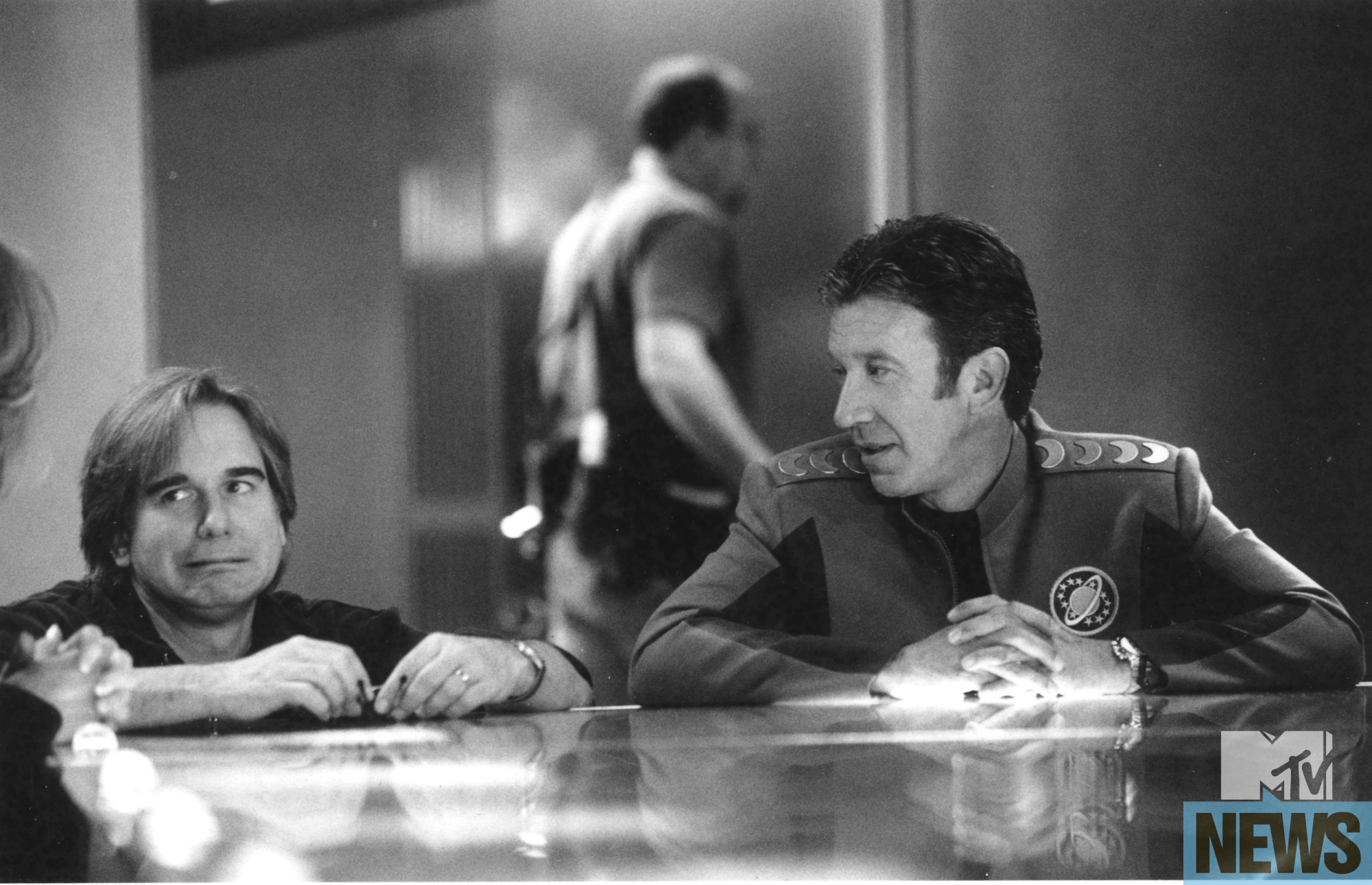
Johnson: I grew up in Spain, so I didn’t know “Star Trek.” But it’s so much fun, and it was wonderful when we found out how the “Star Trek” fans loved it and got the joke.
Graeme McMillan (writing in The Hollywood Reporter): “Galaxy Quest” is the seventh greatest “Star Trek” movie ever made, according to Trek fans [who voted at] this past weekend’s Star Trek 2013 Convention in Las Vegas.
Gordon: I love, particularly, the “Original Series.” Watched them over and over and — I’m an old man — so I’ve watched them from the time I was six-years old in 1966. The movie got green-lit basically off my first draft.
Johnson: Walter Parkes, the head of development at DreamWorks, called me and they were desperate for movies. I had Bob’s first draft of “Galaxy Quest” and he said, “We’ve got to have it, we’ve got to have it now!”
Gordon: The first director was Harold Ramis. So I worked with Harold Ramis a little bit developing it.
Parisot: Ironically, I had already made a movie with Mark Johnson, a Vince Gilligan script, now best known for “Breaking Bad,” called “Home Fries.” Mark and I loved working together, but the studio wasn’t ready to hire a guy who had only done a small independent movie. So Harold Ramis came on. The studio wanted Tim Allen to do it, but Harold didn’t want to do it with Tim. At least, I believe that’s the story.
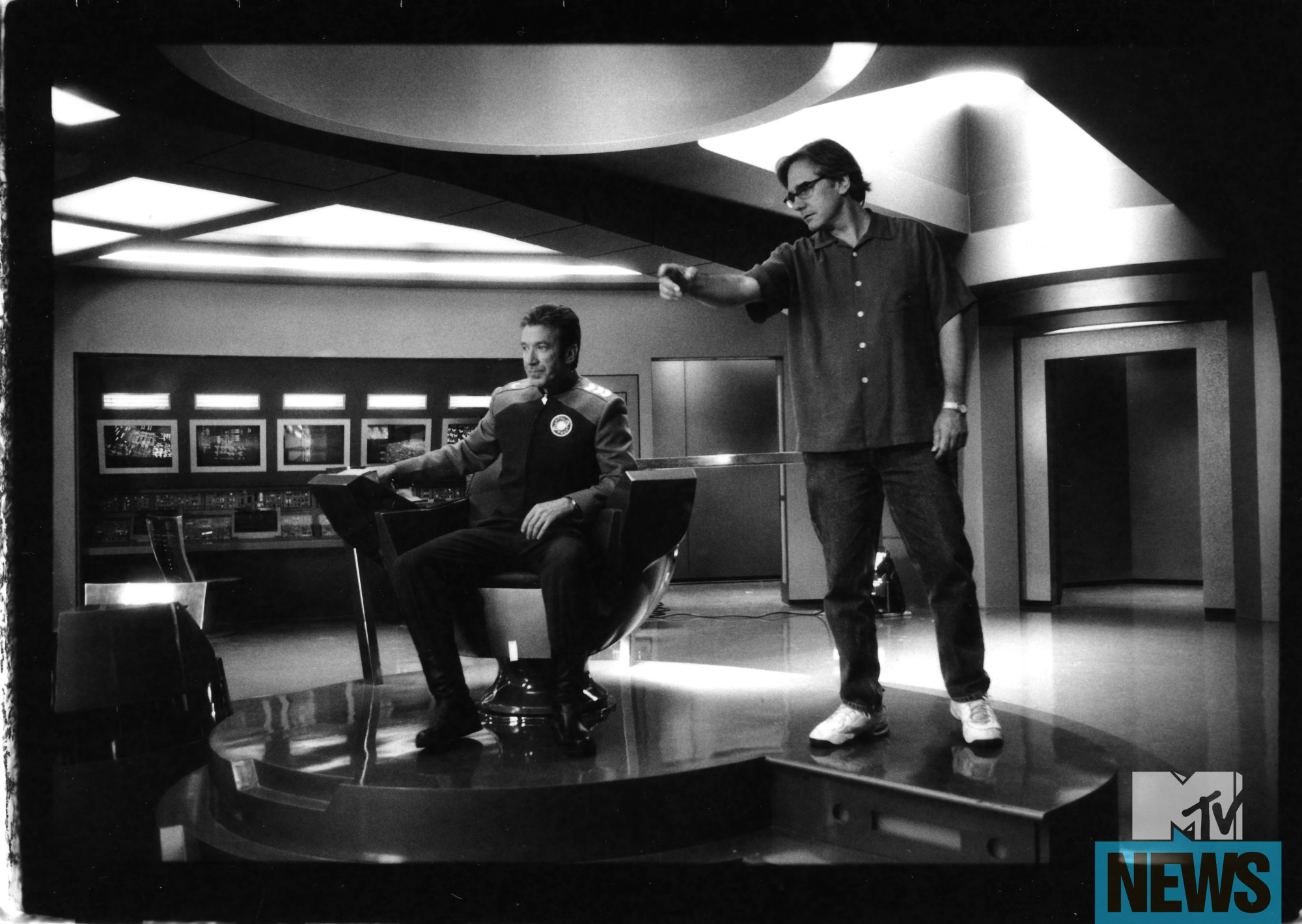
Johnson: Harold didn’t do the movie because we couldn’t cast it. The people we went to all turned it down, and by the time we got to Tim Allen, Harold couldn’t see it. To Harold’s benefit and credit, when he eventually saw the movie, all he kept saying was how wrong he’d been.
Parisot: Harold wanted Alec Baldwin, which also would have been phenomenal.
Justin Long (Brandon, the young fan) [reading a text from his neighbor, Alec Baldwin, when he offered to confirm this rumor]: Yeah. Baldwin says he was offered and then un-offered. Same with “The Godfather,” “Arthur” and “Pride of the Yankees.”
Johnson: It needed a serious actor – we went to Steve Martin, people of that ilk.
Parisot: Kevin Kline was considered for Tim’s role, too.
Johnson: Kevin Kline – it wasn’t like he didn’t like it, and he and Harold knew one another – but he turned it down because of personal life reasons. I think he didn’t want to leave New York.
Gordon: Harold Ramis . . . how could you possibly do better? His films are my favorite films, he was such a sweet guy, just really smart. But I got lucky twice. Dean and I saw eye to eye. He played it straight, but he got an amazing performance out of Tim Allen.
Tim Allen (Jason Nesmith/Commander Peter Taggart): Jeffrey Katzenberg got a hold of me and said, “We have a perfect movie that would use your smart-ass skills and it’s science fiction.” I was looking at two other movies at the time. One didn’t get made. It was an angel movie. The other one Robin Williams ended up doing. It was about a robot. “Bicentennial Man.” But it had no sense of humor to it. It’s very sad. How do you make a robot that doesn’t look like Data? But anyway, within three weeks of casting me, “Galaxy Quest” had Dean Parisot and went into a very different direction.
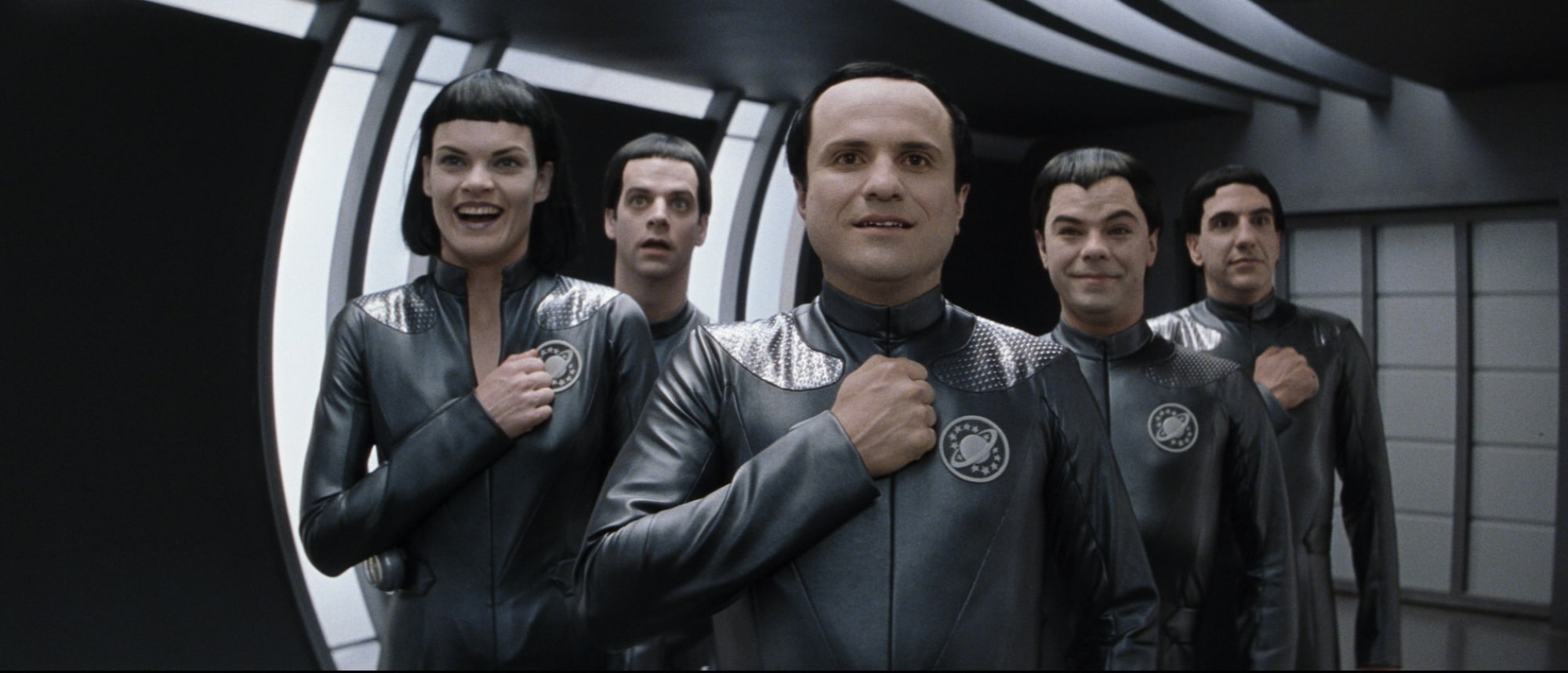
Missi Pyle (Laliari the Thermian): I know Jennifer Coolidge was up for my part. She came in and did the character as impressions of a bunch of other actors and actresses and of 1940s/1950s movie stars. I heard it, and it was really great, but I don’t think it was quite what they were looking for.
Daryl “Chill” Mitchell (Tommy Webber/Lt. Laredo): I was head to head with David Allen Grier.
Sam Rockwell (Guy Fleegman): I know Paul Rudd auditioned, not sure if for my part or not.
Long: I remember thinking I didn’t have a shot. It was one of my first movie auditions. Kieran Culkin and Eddie Kaye Thomas and Tom Everett Scott were all in the room, and these guys were movie stars.
Sigourney Weaver (Gwen DeMarco/Lt. Tawny Madison): I heard about it from my agent. He said they won’t consider anyone who has done science fiction. I insisted on being seen.
Tony Shalhoub (Fred Kwan/Tech Sgt. Chen): Initially, I went in to audition for Guy Fleegman. Then they cast Sam [and] offered me the part of the Asian guy. I said, “I’m not going to play an Asian guy, but I’ll play a guy that plays an Asian. How about that?”
Rockwell: I originally turned it down. I loved the script, but I was committed to do a small movie as a lead opposite Marisa Tomei, but Kevin Spacey convinced me to do it. I went and saw him in “The Iceman Cometh” and he knew I was struggling with this decision and he said, “I think you know what to do.”
Parisot: I was a little nervous about Tim, because I cast everybody except for him. But Tim was perfect, just perfect for this role.
Alan Rickman (Alexander Dane/Dr. Lazarus): Tim Allen used to kick the door open to the make-up trailer. We would be all lined up and he would say “Number one is here!”
Rockwell: If the chairs were taken, Tim would shout, “That’s fine, I’m first on the call sheet, but I’ll go take a walk and come back when you’re ready!”
Weaver: I think that is the only persona Tim has. There’s a lot of waiting around. Tim never stopped joking.
Shalhoub: A lot of fart jokes with Tim. Some weren’t jokes, some were actually farts.
Pyle: It was like working with 12 year old boys.
Parisot: You can’t get annoyed at Tim. Tim is like your little brother who comes in and just goofs around. Maybe it got annoying for Alan, but you could never tell whether that was Alan being in character or Alan actually responding to Tim.
Mitchell: They would call action four times, but we didn’t hear because we were laughing so hard. And Alan is looking at us like, “Really, man?”
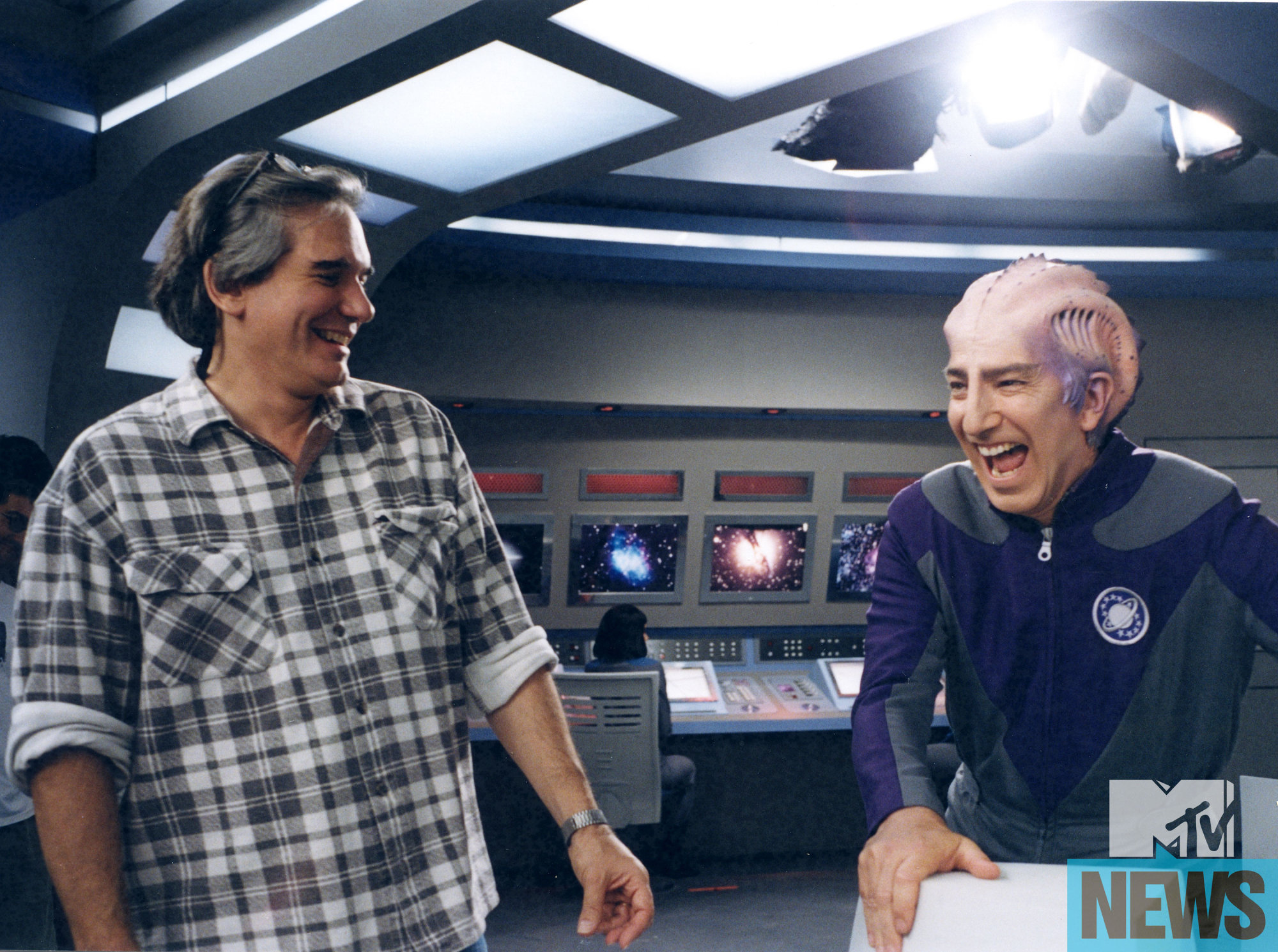
Rickman: I mean, in hindsight, probably at the time I just thought it was good and it helped with the scene. When you have the clothes and makeup of the character on, something happens. Like 10 years of playing Snape . . .as soon as you sew up those buttons and put the black wig on, something happens, because that is what you have to rely on.
Pyle: I think Alan had a great time, I just think he was like . . . what exactly are you doing?
Allen: I am not a thespian. I am a trained standup comedian.
Parisot: Everybody gets their bearings during the first week or two during a movie. But Tim committed to this 1000 percent. All his fooling around didn’t matter. He worked with a trainer like DeNiro did for the opposite of “Raging Bull,” because he knew he had to take his shirt off.
Allen: I go to the beach like anybody else, but I’m not that type of person. I had a professional trainer go and I starved myself on a protein diet. You need someone to watch you, you get real weak! I don’t know how these guys, like Captain America, how do you look like that?
Pyle: That scene where Tim tells Mathesar [the head Thermian, played by “Veronica Mars” star Enrico Colantoni] that we lied, it’s so sweet, so beautiful, so sad.
Allen: Steven Spielberg was on the set for one day – the day when I had to apologize to Enrico’s character, Mathesar. He’s being killed and I have to admit I’m all bulls–t. Now, I come out of the comedy world. This kind of stuff doesn’t come easy to me. I didn’t see him, he was at the director’s camp, but he came by and said, “That was really good.” It wasn’t like he was ass-kissing. Why would Steven Spielberg have to do that with me? But he said something very professional and I was like, “Whoa.”
Rickman: I met Steven Spielberg that one day, and it was hard to have a conversation. You could hear every word coming out of your mouth and you just want to stop talking.
Mitchell: Let me tell you the coolest part: he got me a bottle of water. Mr. Steven Spielberg got me a bottle of water.

Long: Someone told me that Spielberg’s the reason I’m in the movie. That they were going to cut my role down to almost nothing, but he said that it needed an element to connect to the fans, a human element. This was according to…according to someone.
Johnson: Steven can come in, even with so many balls in the air, and look at what you are shooting or cutting and get right to the heart of the matter and say, “Why not do this?”
Pyle: I heard that Spielberg was there. He came and then he saw my character and makeup and decided she should be a bigger part. I was only supposed to be in two scenes and then they realized they didn’t have another female except Sigourney Weaver. And I just think, “Am I in a dream, because this is ridiculous?” So they added the relationship with Tony Shalhoub’s character.
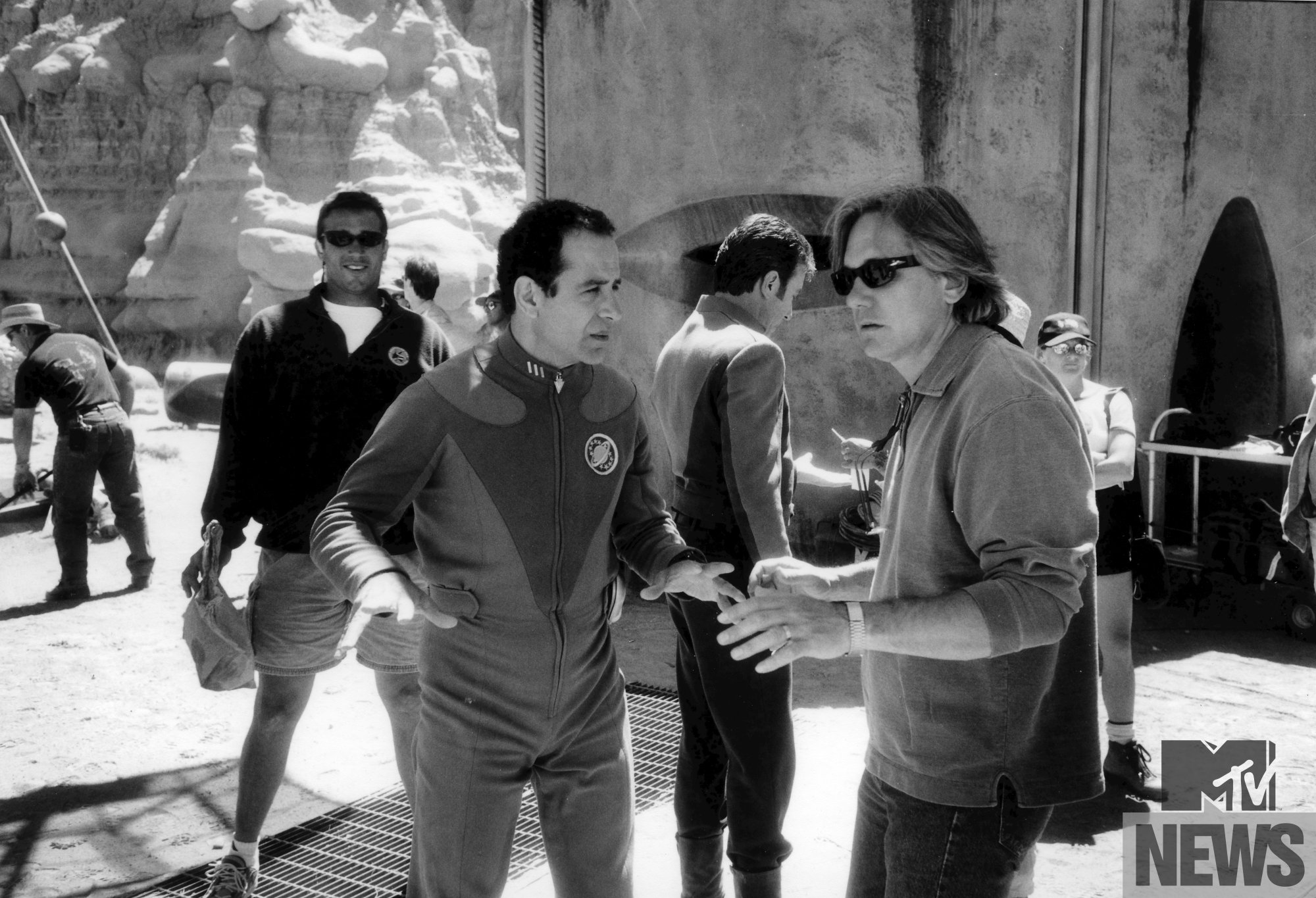
Shalhoub: My part as written – we basically had to throw it all out because it didn’t work with me in there. I mean, we couldn’t figure out how to make that work. So Dean said, “Look, we’ll invent a new character as we go along.”
Parisot: Tony and I were talking all the time, “There’s nothing here, there’s nothing here, what are we going to do, what are we going to do?”
Shalhoub: It’s a tribute to the other actors that they were open to us changing my lines every day. Usually, when you come to work, people want to know what’s going to happen.
Parisot: Tony brought up David Carradine in “Kung Fu” [another example of a non-Asian actor playing an Asian character] and the story goes — I don’t know if it’s true — that David Carradine was completely stoned all of the time on that show. Dialogue would just come out of his head and people would just stare at each other and think, “Where did that come from?” We knew we couldn’t do a stoner because we needed to hit a PG-13, but we basically suggested that.
Rockwell: Tony played it like a failed Scientologist.
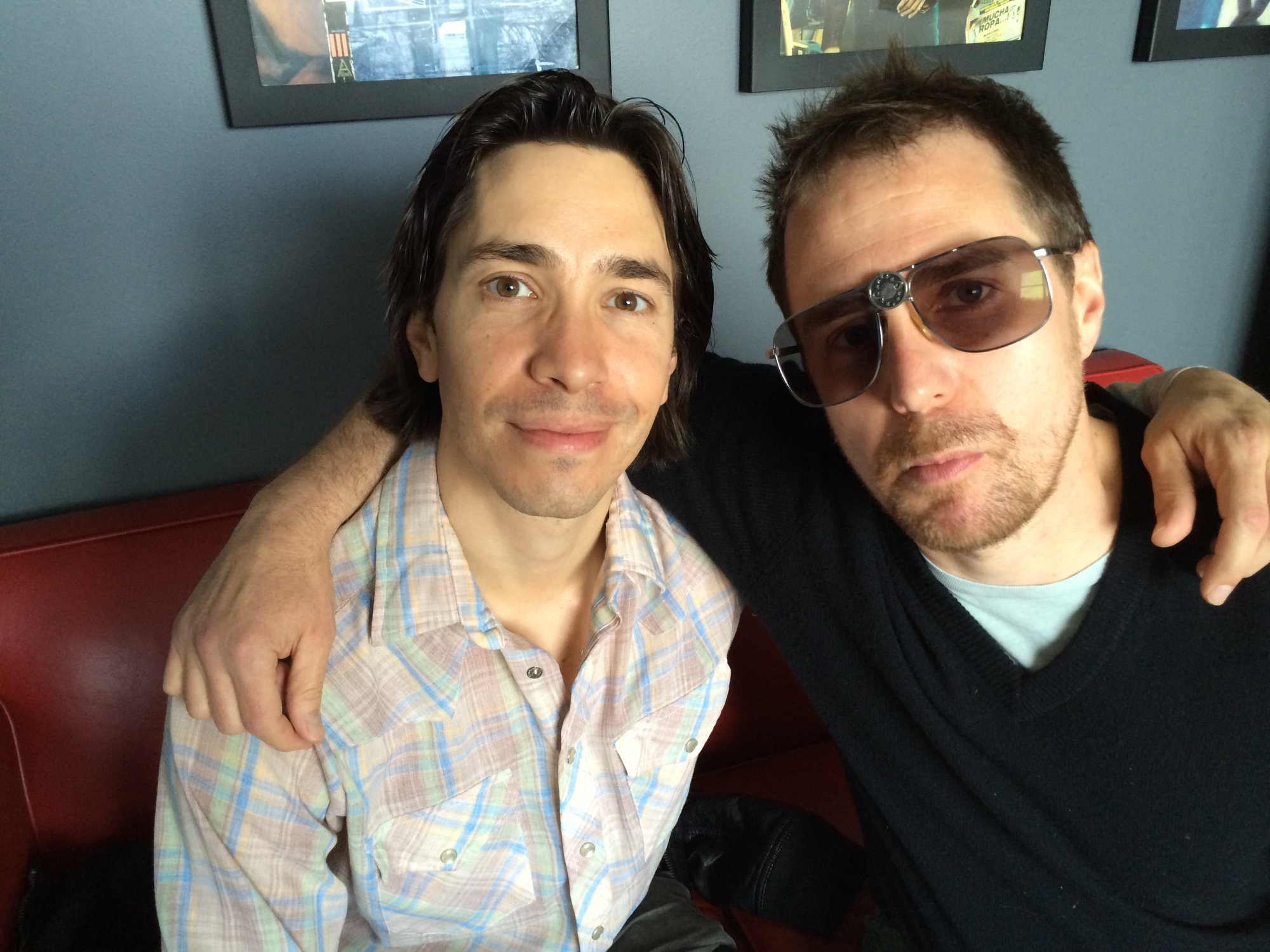
Shalhoub: I thought the guy should always be eating. He should never go anywhere without his little stash of food because when you’re an actor, you never know when your next meal is. The prop people were just giving me little stuff from craft services and if I didn’t like it, I’d go find my own.
Pyle: Dean came to me with new pages, saying, “We have to make this romantic.” This happened in a minute. It’s literally that we kiss, then we are holding hands and Mathesar ends up looking at her face and then she ends up coming home with him.
Gordon: Sam Rockwell came up with seeing them kiss and saying, “That’s not right.” I forget what I wrote, but it was not nearly as good as that.
Pyle: Sigourney Weaver would occasionally just throw me tidbits of wisdom. And then on our last day, she reached over and whispered to me and said, “Steal your costume.”
Allen: At first I thought there were two Sigourney Weavers. Literally, what was she thinking? It looked like a smaller movie at first. She had just come off one of the “Aliens,” and I said why would she do this?
Weaver: It’s funny, considering my background, but I was never into science fiction. I liked “The Twilight Zone,” that’s as close as I ever got. I thought “Flash Gordon” was stupid. I think “Star Trek” happened and I missed it. I was in the theater, and then suddenly I did “Alien.” Suddenly I was straddling two very different worlds. I’ll watch “Star Trek” once in a while – look at those cheap sets! But I also love to watch it as a “Gwen,” watching actors giving dignity to an absurd situation, speaking Klingon. But every time I see “Star Trek,” I just see a lot of people dressed as shepherds. They’re always medieval or something. I can’t get by it. Whenever I flip past, that’s the episode I see – a bunch of shepherds. It’s the reason I never wanted “Alien” to go to Earth! You’d see the culture – a bunch of shepherds, ugh! The closest you get to Earth is in “Aliens” at the beginning, on the space station. And poor Burke, Paul Reiser, he’s wearing that absurd collar. It just says FUTURE and it doesn’t work. In “Avatar,” it’s all military and on the ship, so it avoided all that. But I just felt “Galaxy Quest,” as a comedy, was such a love letter to all the insecure actors in the field who have done so many wonderful and somewhat under-appreciated projects, and even though “Star Trek” is very popular, it was very…specific.
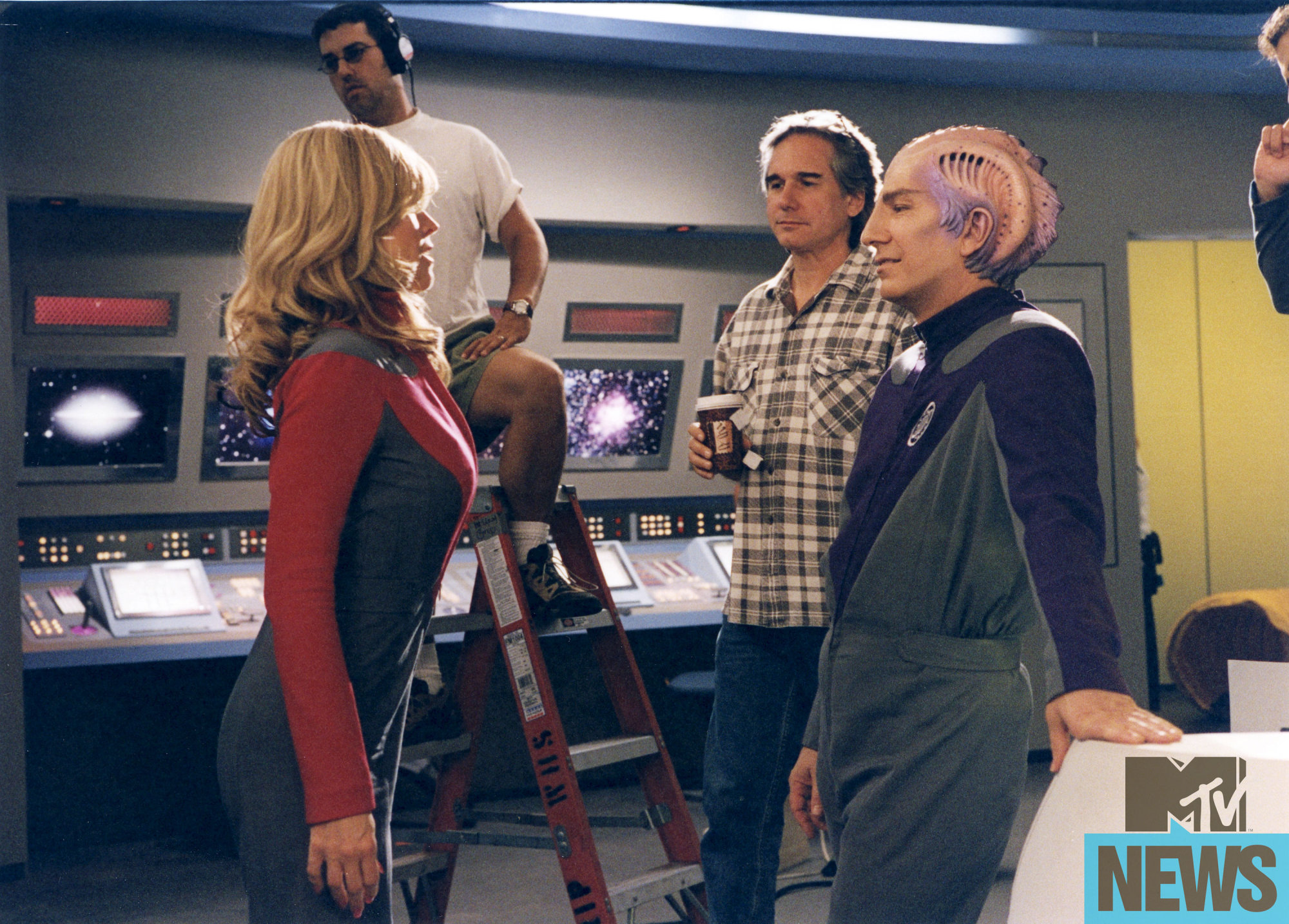
Rockwell: Sigourney Weaver changed with that wig.
Rickman: I remember Sigourney walking around saying that she was experiencing a new world with the blonde wig.
Johnson: Sigourney loved her extenuated bosom and blonde wig. She’d sometimes leave at the end of the day dressed up like that. She’d just go to her hotel with the enhanced breasts and padding and all squeezed in and it was fun.
Weaver: Blondes definitely have more fun. I loved being a starlet. I miss my breasts, I miss my blonde hair, I miss my insecurity.
Allen: I kept looking at her and she is remarkably attractive, sexy and funny at the same time but too tall for me. I was afraid of her because I was going to have to kiss this woman.
Weaver: Tim was supposed to kiss me, and he weaseled out of it. Very Tim. We were supposed to have this big moment and he completely let Gwen down and ran away, it was so perfect.
Allen: I bugged the s–t out of Sigourney with something from “Alien” that I bought. A plastic, thermo-cast relief and I annoyed her to death to sign it. She kept saying, “of course I’ll sign it,” but the movie was getting close to wrapping and I really meant it. I had to beg her. I had to put my foot down and say, “No, you are going to go back to New York and I’m going to have to fly out this f–king piece that’s on my wall.”
Weaver: He had this piece of the wall of the Nostromo or something, and he was so proud of it. I wrote on it: “Stolen by Tim Allen. Love, Sigourney Weaver”
Allen: She eventually signed it with a smart-ass comment.
Weaver: He was so upset. “Why would you write that?! I was going to put it in my screening room!” Which was such a Hollywood thing to say.
Allen: She never asked me to sign anything. She doesn’t care.
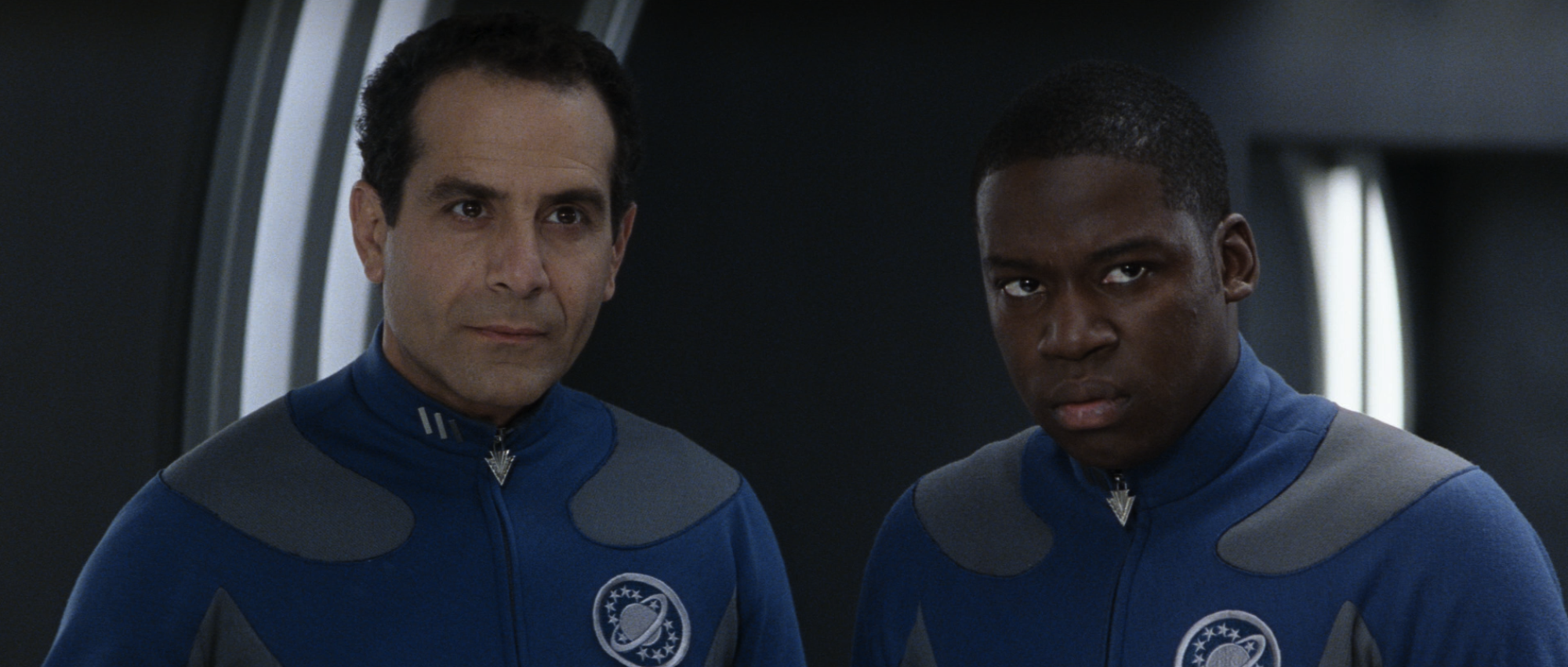
Mitchell: For my birthday, Sigourney set up a stripper to come to the set and do a quick lap dance. They put her in a uniform, so it wasn’t hard to slip her in because we had a lot of extras. But when it was time for the stripper to dance, Sigourney runs out the room like there’s a fire. I’m like, “You’re going to bring this stripper and then you’re going to leave?”
Rockwell: We all went to a big 20th anniversary of “Alien” with Sigourney.
Weaver: I actually wanted to go as Gwen, but I wore regular clothes. But I did keep on the blonde wig.
Mitchell: The part in “Alien” when Sigourney was in her panties? Tim shouts out “Yeah, baby!” Now here we are in an intense moment, trying to act like we didn’t see it, having some dignity – and Tim screams “Yeah, baby!” Everybody started laughing.
Rockwell: Tim really liked saying, “Yeah, baby.”
Long: “Yeah, baby!” I remember that. I also went and saw “Deep Blue Sea” with Tim. Sam Rockwell was there and Phil[ip Seymour] Hoffman, and when Sam Jackson’s character got eaten by the shark Tim went into a whole routine in the theater.
Allen: I was really rude to Justin Long when I first met him.
Long: When I first met Tim, I was accidentally sitting in his chair. And I was so, so nervous, it was my first movie, and I said, “how are you, Mr. Allen?” and he just stared me down.
Rockwell: Tim was totally f–king with Justin.
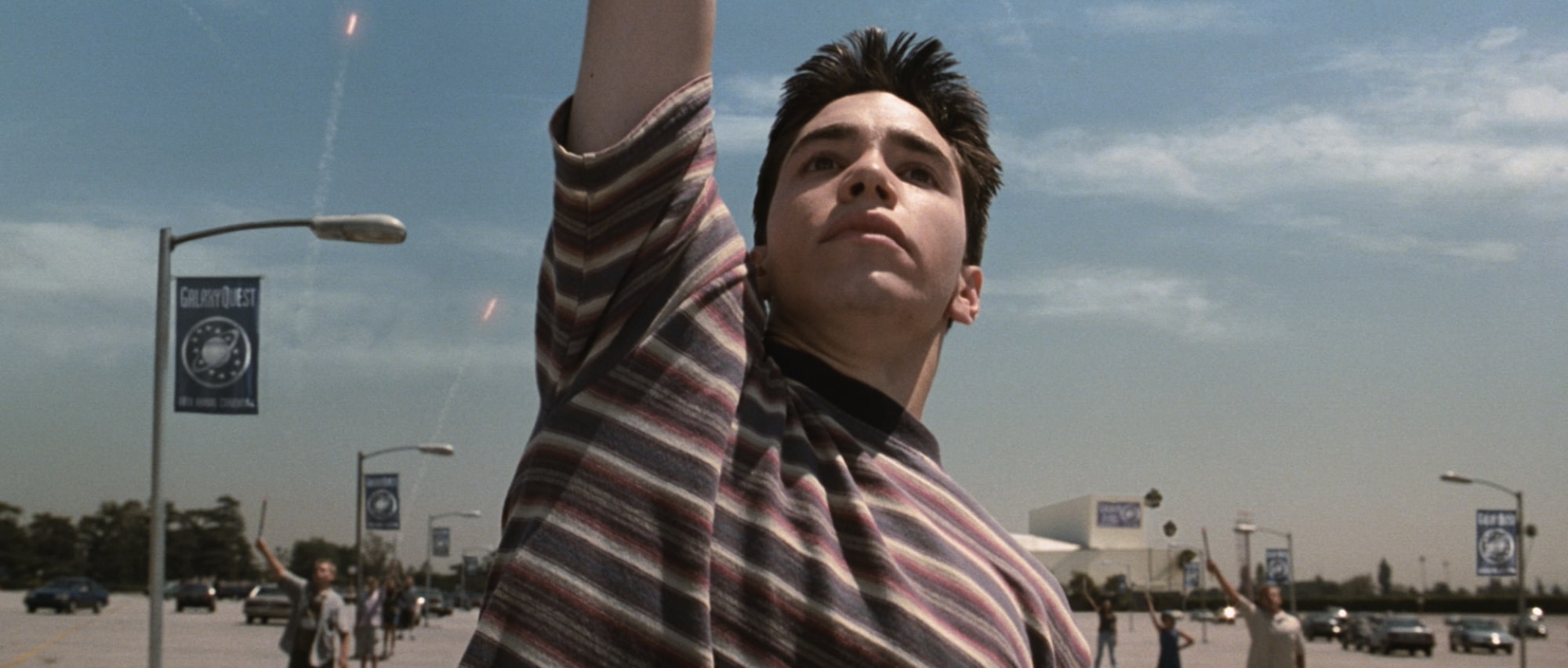
Long: It was my first film. I really didn’t know how movies were made. The shot where the ship crashes was this big crane shot. The camera was following me running through this crowd of background actors. It’s a pretty involved shot, there was smoke and all of these guys are stumbling out of the ship, and I remember Dean told me exactly where to go. We rehearsed it and then after rehearsal some of the extras could smell that I was really green. So one of them said to me, “Hey, maybe we’re buddies and when you pass by me you can give me a high five.” I had just done plays where the actors collaborate and figure things out, and I was like, “OK, yeah, high five.” So then they all saw me and descended upon on me, and we created this whole elaborate collection of handshakes and stuff. Dean calls action and the crane is going up, and I start running through and I’m high fiving, doing my business with everybody and I get up to the stage, completely missing my mark, ruining the shot. Dean, who has a very good temperament, didn’t yell, but he was like, “What the heck was that all about?” I turn around and all the extras are gone.
Parisot: Justin was so good that we finished his stuff a little ahead of schedule. I had had a big altercation with the line producer. They wanted to drop the garbage bag scene. We were running out of time, so I reluctantly agreed to not shoot it, and then when we shot the day I ran outside quickly and got it in two takes.
Rockwell: That shot of Justin and the trash is the heart of the movie.
Gordon: The line that I like the most when I’m watching with an audience – because it gets this delayed rolling laughter – was one I knew was great when I typed it. I hate it when people say this, but it surprised me when I wrote it. It’s when Sigourney says, “We gotta get out of here before one of those things kills Guy!”
Rockwell: I wanted to ennoble the coward archetype. I thought of the best cowards in cinematic history, like John Turturro in “Miller’s Crossing.” When we did the shuttle scene I drank four cups of coffee and downed two Excedrin. I wanted to be so hyped that I would have a nervous breakdown on the shuttle. I don’t know if it worked but I was very hyper and freaking out. I think I had a couple beers to come down.
Mitchell: Sam Rockwell in this movie, man. I die every time. “Did you guys ever WATCH the show?!?”
Johnson: “Did you guys ever WATCH the show?!?” That’s my favorite moment.
Rockwell: Guy is a cheeseball. And a Trekkie geek. But he’s a coward. My template was Bill Paxton in “Aliens” mixed with Michael Keaton in “Night Shift.”
Long: I was channeling Phil Hoffman from “Boogie Nights” mixed with Comic Book Guy from the Simpsons.
Allen: When I was in that Captain’s chair I was not mimicking William Shatner, with whom I’m now friends because of this movie. I liked the way Yul Brynner sat in his throne in “The Ten Commandments.” I worked off of that. I studied that. Well, I rented the tape.
Gordon: “Never Give Up, Never Surrender” came from Winston Churchill, via a Supertramp song because I was a huge Supertramp fan. The rock monster is not really a reference to [the cut scenes of the rock monsters in the William Shatner-directed “Star Trek V: The Final Frontier.”] I’ve read about it since. But, yeah, I would say the Gorn [the famous lizard creature Shatner fights on a desert planet while the crew watches from the ship] was very much on my mind. Plus the transporter malfunction and taking the ship out of dock, winking at “Star Trek: The Motion Picture.” In fact, the early drafts were called “Galaxy Quest: The Motion Picture.” There are some other direct sci fi things in there. “Westworld,” with Yul Brenner, is one of my favorites. When Quellek [Patrick Breen] says, “I’m shot,” that’s a direct reference to James Brolin in “Westworld.” The little blue babies are a nod “Barbarella,” cute and then mean. When Jason triggers the Omega 13, I was inspired by the end of “Beneath the Planet of the Apes.” And the few clips you see of the original show, what Dean did was so great, he really made the camera moves and the recycled sets look like old, cheap “Star Trek.” I wish you could see more of it in the film.
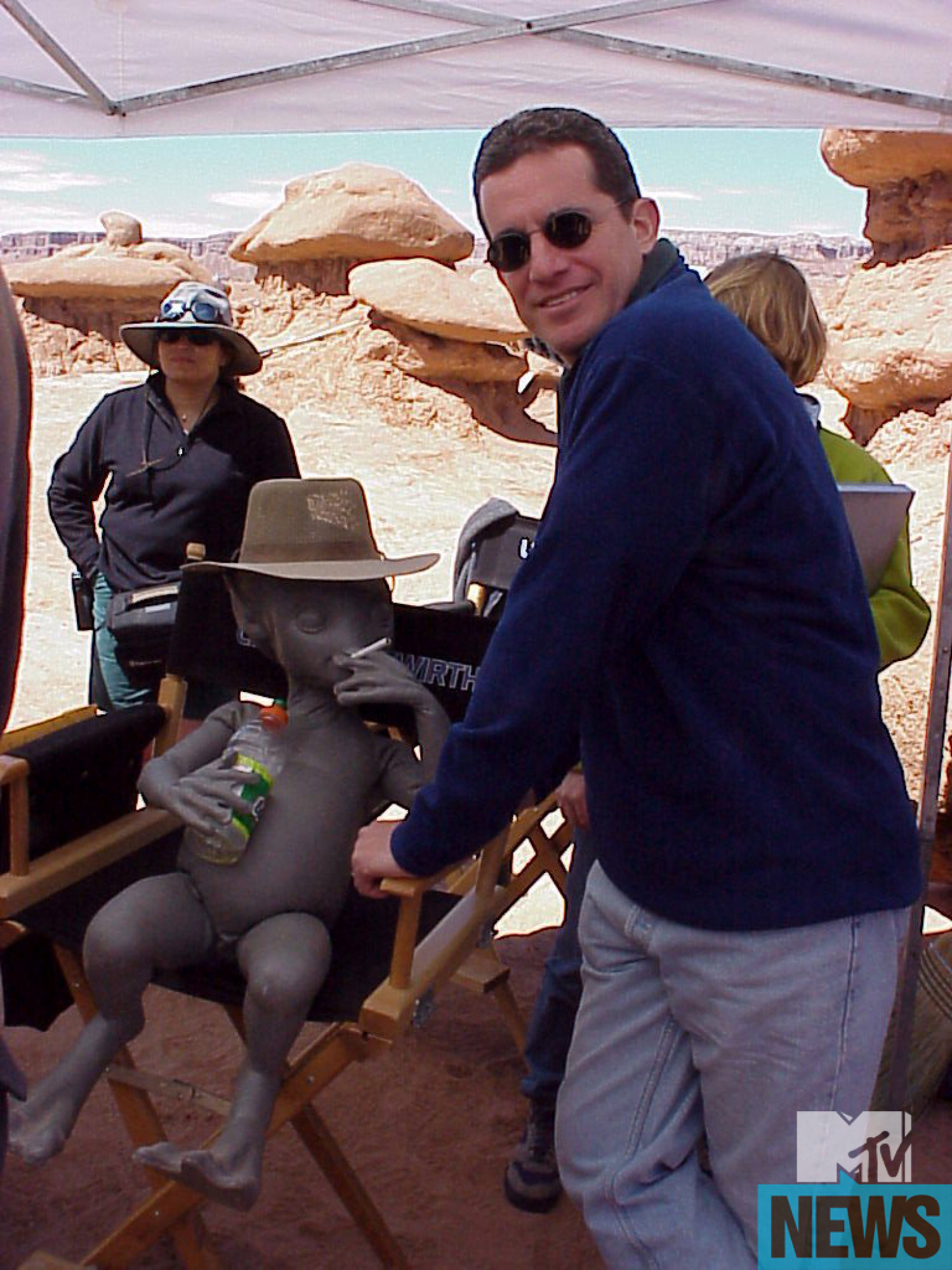
Parisot: Everybody was afraid of being sued. When we made that movie everything we would start to design or come up with, it couldn’t help but be relevant in some way to “Star Trek.”
Shalhoub: We never said “beam.”
Parisot: We were constantly being told we had to change things. Now, I probably shouldn’t admit it, but the adults weren’t watching us too closely when we were making this. DreamWorks, still in their first push, were making a bunch of other movies, and “Gladiator” was a big deal, and we were sort of doing our thing.
Johnson: When you are making a movie with a studio, you always want there to be another movie that’s in trouble, so that’ll get their attention and they’ll basically leave you alone.
Parisot: They were worried about the Captain’s chair, they were worried about the uniforms. I ignored it, so I was actually terrified when it came out. But DreamWorks was also a filmmakers’ studio at that time, it was Spielberg. They even let me get a little too clever for my own good with the changing aspect ratio. The movie starts out in television aspect ratio and [when they get to the ship] it goes to 1:8:5, which is more traditional, theatrical. It kind of backfired on me [with projectionists.] They wouldn’t open the curtains wide enough.
Gordon: There’s talk about the so-called R-rated version of the film. When I originally wrote it, I wasn’t thinking about a family film, just what I wanted to see. So when the ship lands in the convention hall in the original draft it decapitates a bunch of people. There was also stuff we shot where Sigourney tries to seduce some of the aliens. It was cut – and that’s why her shirt is ripped at the end. Also the worst dubbed “F-bomb” ever. Good for Dean for never shooting coverage on that.
Johnson: To this day I’m sorry we made it PG rather than PG-13. We took out Sigourney Weaver’s “F–k,” one of the best laughs in the movie.
Allen: They cut the scenes where we see our quarters. And Alan’s, oh, man. It’s like a proctologist’s dream and nightmare. All of these sharp things around his anus. It was so f–king funny.
Gordon: “By Grabthar’s Hammer” was a temp line. It was basically the Hammer of Thor, but Grabthar just sounded so silly. I kept meaning to change it, but around the production offices, they started to make t-shirts, it started to sink in a little bit.
Rickman: The ending scene, where Kwellek is dying, and I say the “Grabthar’s” line for him. There were all these different layers with these characters. It is such a great acting challenge. You are only as good as the script, really.
Long: The funniest line, at the mall. “By Grabthar’s Hammer . . .what a savings.” I just saw Nick Frost and he said he and Simon Pegg and all those guys, that’s the line they quote all the time.
Pyle: John Updike mentions my character in a sentence in one of his books. [2000’s “Rabbit Remembered”.]
Allen: David Mamet, he loved this movie, he wrote about it in one of his books! [2008’s “Bambi vs. Godzilla: On The Nature, Purpose and Practice of the Movie Business.”]
Weaver: When people shout at me on the streets of New York, it’s “Alien” more than anything, but “Galaxy Quest” is right up there second as much as “Ghostbusters.”
Pyle: People ask me to make the sound a lot. Which I can easily do. The description in the script was “a baby in a bagpipe.”
Rickman: There’s a “Galaxy Quest” comic with Alexander Dane as Hamlet on the front? I was not aware.
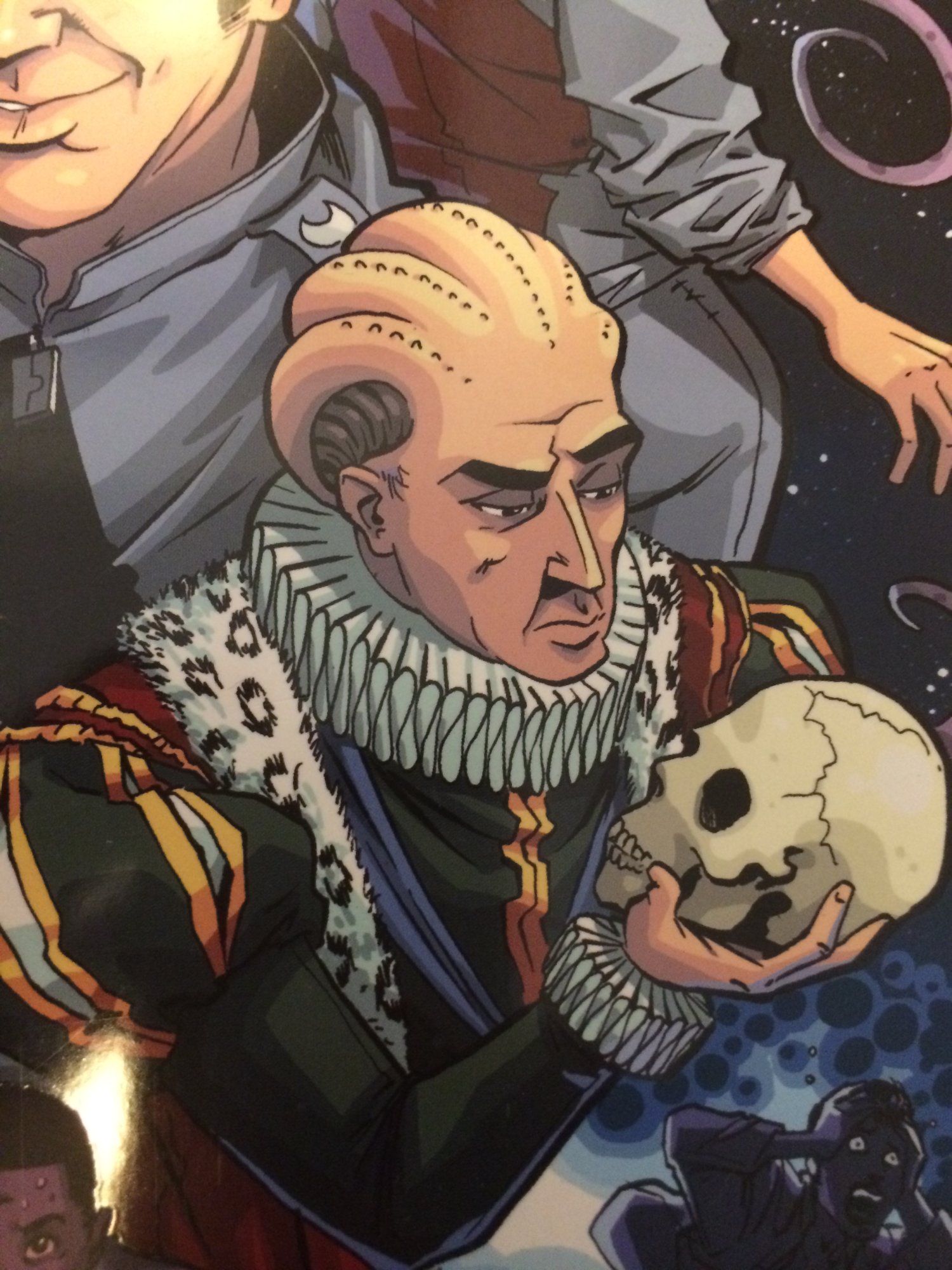
Weaver: There’s a “Galaxy Quest” comic? Is Gwen in it?
Parisot: I did not know about the “Galaxy Quest” comic until a few months ago. There was a screening and Tim and I went. At the end of it somebody handed it to me. He was dressed in a “Galaxy Quest” uniform, approaching me as the Thermians did to Jason and the irony was not lost.
Rockwell: Somebody must have sprinkled fairy dust on that movie because everything just clicked into place somehow, in the long run.
Parisot: DreamWorks was interested about making a television show about the Thermians. It had to do with a younger bunch of actors who are now on the show. So, old crew vs. new crew. Which was all to DreamWorks’ credit because the movie was not the financial success it should have been.
Johnson: Terry Press [now co-president of CBS Films] was the head of marketing and didn’t believe in the movie. We had a critical screening in the Valley. Terry was pregnant with twins and couldn’t go. Had she been there she would have realized this was an audience movie. We never got a one sheet [poster] that was right for this. They just didn’t sell this one correctly. I remember going to the premiere and Jeremy Zimmer the head of UTA, coming up to me with shock in his voice: “that was fantastic! Who would have known!” You want to shoot yourself at times like that. Terry, to her credit, brought me in to discuss all this at a class she teaches at UCLA.
Rickman: The fact that the logo didn’t change from the call sheet to the poster was a sign [that the marketing was in trouble.]
Rockwell: It was kind’ve in the top 10 for a few weeks, but it wasn’t a phenomenon. It wasn’t “GhostBusters.”
Parisot: Jeffrey Katzenberg called me the second week and said, “We’re sorry, we blew it, we didn’t advertise this properly.” Which was really actually an incredibly menschy thing to do. It became this thing where I would walk into meetings and people would say, it’s a shame how they marketed that movie. They looked at it as a Christmas movie for kids. They put it in theaters that were for kids and matinees. Our big argument was that there was a much larger audience, but they didn’t believe that. But by the second week, adults started showing up, which sustained it in a very strange away. It kept making the same amount of money each weekend for four weekends in a row. Unheard of today.
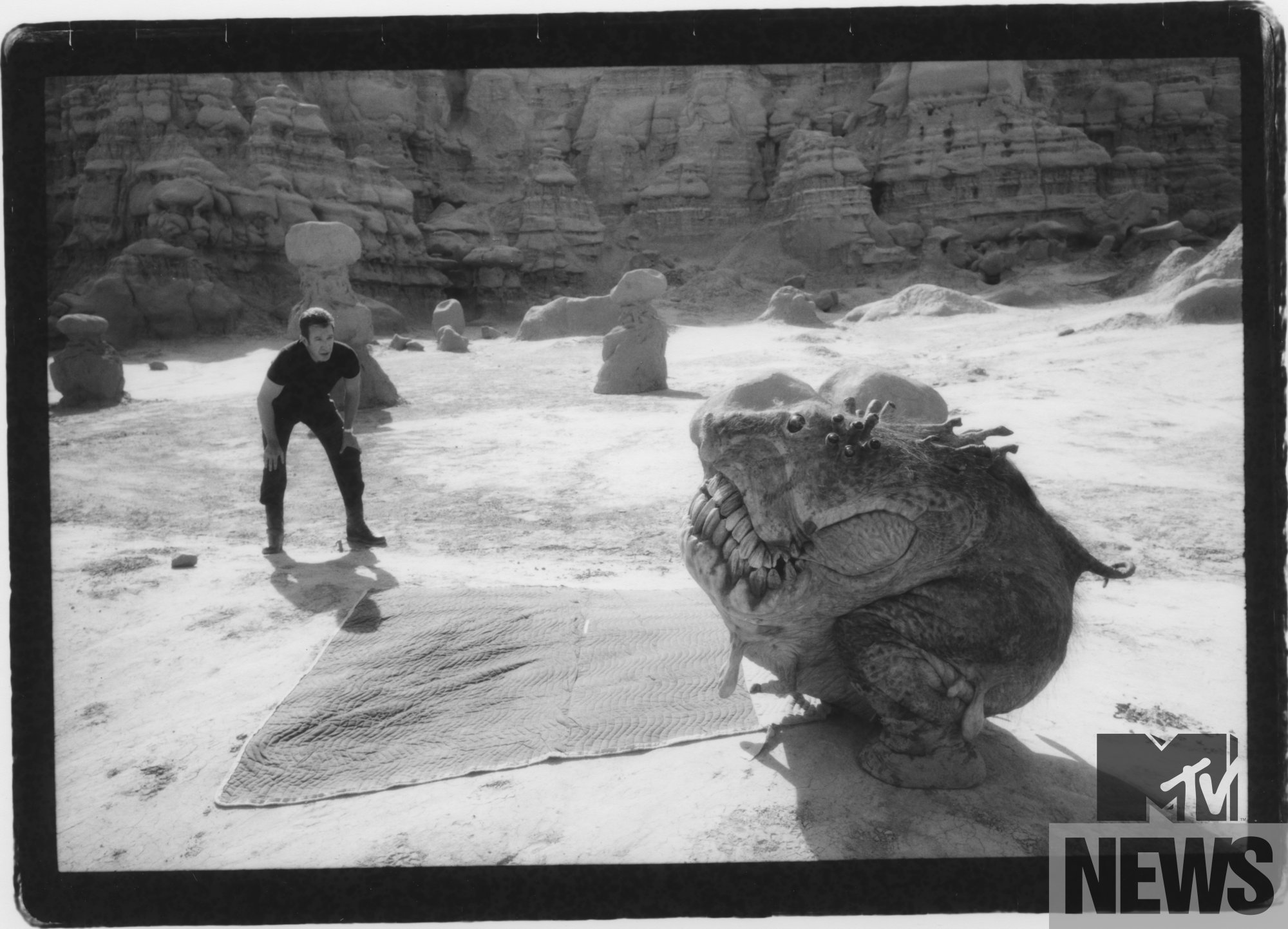
Allen: There’s a sequel somewhere. It’s written, but I haven’t really gotten a straight answer about it, but Hollywood is a very peculiar place. It is none of my business.
Gordon: On the record, I definitely have ideas for a sequel. Off the record, OK, turn your recorder off.
Long: So many people ask me about a sequel.
Johnson: If we announced a sequel or a TV show, there’d be genuine excitement, not “It’s too late.” We’ve tried. I’d do it, Dean would do it. But we need Bob. It’s a Bob Gordon joint, but Bob is a very specific guy.
Rockwell: F–k yeah, a sequel would be amazing. If it was a respectful script to “Galaxy Quest”.
Weaver: Tell Bob, tell Dean, we are all ready for a sequel. I still have my costume!
Allen: How’s this for a sequel: it’s 15 years later. The Thermians come back, but they haven’t aged. Maybe they don’t have warp anymore so it took 15 years. They have to search for a new homeland. Sarris [the main villain] is gone but his family never forgets and you take it from there. . .
Rickman: People didn’t get it when it first came out. It is genuinely funny, however. Extremely funny. A truly great piece of writing.
